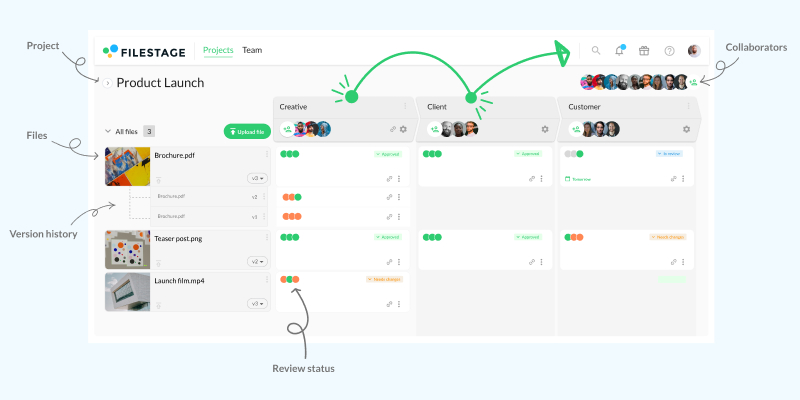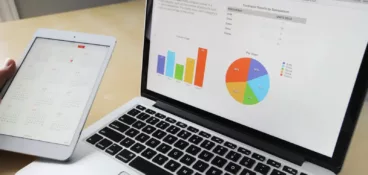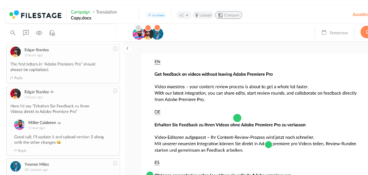Any marketing manager will tell you that managing an entire marketing campaign is no mean feat.
Multiple departments and stakeholders. Tight deadlines. Complicated budgets. Confusing analytics. The list goes on.
It’s like a massive puzzle with hundreds of pieces that you have to fit together to form one big coherent campaign.
That’s why effective marketing campaign management is crucial. Without it, it’s a free-for-all of tactics, channels, and teams. Which isn’t exactly a recipe for strategic success.
In this guide we’ll explore the importance of good marketing campaign management and how to achieve it – including the use of marketing campaign management software to make your life that much easier.
Let’s dive in.
Speed up feedback across all your assets
Manage the review and approval of all your campaign content in one place.
What is marketing campaign management?
Marketing campaign management is the process of planning, organizing, executing, and monitoring a series of marketing activities, with a specific purpose and business goal in mind. It’s a tricky process which involves coordinating multiple channels, messages, and resources to effectively reach and engage the target audience, while staying on budget, meeting deadlines, and hitting targets.

Why is marketing campaign management important?
Given how broad and all-encompassing marketing campaigns can be today, it’s hard to carry one out successfully without a strong and effective marketing campaign management strategy.
Let’s take a look at the key benefits of marketing campaign management:
Optimizing resources
Well-managed marketing campaigns help allocate resources effectively. That includes budget, time, and manpower. Marketing campaign managers can pool resources to improve efficiency, avoid duplicate efforts, and work towards a positive ROI.
Keeping efforts on target and on budget
Speaking of budgets, good marketing campaign management helps to keep your efforts within (or under) budget. It also helps you to stay on target, so that you meet every deadline, big and small, along the way.
Coordinating efforts and aligning messaging
When you’re working on a cross-channel marketing campaign, good campaign management helps make sure that all elements work together in harmony. That way, your campaigns are more impactful, your messaging is aligned, and your customer experience is more consistent and memorable.
Driving better results
Ultimately, marketing campaign management is the key to ensuring that all your marketing efforts work together smoothly to achieve the best results possible. By optimizing resources, keeping efforts on target, and communicating a unified message, you increase your odds of success!

What does a marketing campaign manager do?
A marketing campaign manager is responsible for coordinating every aspect of the campaign and keeping the entire process on track and running smoothly.
The role might vary from one organization to the next, but here’s an example of what campaign managers’ responsibilities generally involve:
- Collaborating with marketing team members and key stakeholders
- Planning the campaign and developing the strategy
- Scheduling and overseeing campaigns to keep them on track
- Delegating tasks
- Providing updates to stakeholders
- Tracking and reporting results
Types of marketing campaigns
Before we look at how to successfully manage a marketing campaign, let’s take a look at the main types of marketing campaigns:
- Brand awareness campaign – these campaigns aim to increase recognition and familiarity with a brand among a broader audience. They often use creative storytelling and emotional appeals to leave a lasting impression with potential customers.
- Content marketing campaign – these campaigns revolve around creating and distributing valuable content to educate, entertain, or engage the audience. Content might include blog posts, videos, and podcasts, and the aim is to build authority and trust over time.
- Social media marketing campaign – these campaigns use different content formats, hashtags, and user engagement strategies to increase brand visibility and encourage interaction.
- Email marketing campaign – these campaigns involve sending targeted emails with personalized content, offers, and information to nurture leads and maintain communication with customers.
- Product marketing campaign – these campaigns focus on introducing a new product or service to the market. They build anticipation and awareness through teasers, reveal events, and promotions to generate excitement and sales upon launch.
The outputs and objectives may differ, but every single type of marketing campaign will benefit from effective campaign management.
Speed up feedback across all your assets
Manage the review and approval of all your campaign content in one place.
Seven steps to successful marketing campaign management
Now you know what marketing campaign management is, why it’s important, and what it generally involves, let’s explore how to successfully manage a campaign from start to finish.
- Set clear and specific campaign objectives
- Identify and understand your target audience
- Develop your marketing campaign strategy
- Set a budget and allocate resources
- Create and distribute your content
- Measure the results of your marketing campaign
- Review and learn
Here’s each step in more detail …
1. Set clear and specific campaign objectives
Setting clear and specific objectives is the first step in the marketing campaign management process. These objectives, goals, or KPIs define the purpose of the campaign and the outcomes you want to achieve (and basically prevent you from walking around like a headless chicken!).
Examples of campaign objectives include:
- Increased sales
- Better brand awareness
- Increased market share
- Improved ROI
- Internal objectives
I recommend making use of the SMART goal template so that your goals are Specific, Measurable, Achievable, Relevant, and Timely.

Here’s why setting clear objectives is so important:
- It provides a roadmap for the marketing campaign’s direction and helps to maintain focus
- It shapes the entire strategy, including messaging, channels, and tactics
- It helps you to track the campaign’s progress and measure its success
2. Identify and understand your target audience
Next up, it’s time to identify your target audience and carry out some audience segmentation. Different audience segments will have different characteristics, preferences, behaviors, and needs, so getting to grips with your target audience will help you put the right message in front of the right people in the right way.
Here’s why this step is important:
- It helps marketing teams to tailor their messages to resonate with specific needs and interests
- It helps you choose the right platforms for your marketing campaigns
- It makes sure your marketing campaigns are focused, relevant, and effective – and more likely to be a success!
3. Develop your marketing campaign strategy
Once you’ve set your goals and identified your target audience, you can turn your attention to your overarching marketing strategy. In this step you’ll work out how you’re going to appeal to your target audience, and how you’re going to achieve your campaign’s objectives.
As part of your campaign strategy, you’ll want to think about:
- Messaging – what are the key messages you want to get across? Think about your value proposition, and the calls to action that you want to include across different marketing channels.
- Channels – which marketing channels are best suited to your target audience? Consider social media platforms, email marketing, content marketing, paid advertising, and any other relevant channels.
- Integration – how will these channels work together to deliver a consistent message and experience? An integrated approach will help to create a seamless customer journey.
4. Set a budget and allocate resources
Another key step in the marketing campaign management process is strategic resource planning – covering budget, team bandwidth, and timelines.
If you aren’t starting with a set campaign budget, sit down and create one. Look at historical campaign performance to understand what kind of budget is needed across each of your channels to support your goals.
You’ll also need to understand your team’s capacity and create a realistic timeline based on resource and availability. Overstretching your team will result in low morale and a less successful marketing campaign, so is pays to be realistic.
5. Create and distribute your content
Now’s the time to get creating that compelling campaign content! That might be anything from blog posts and social media posts to videos, podcasts, and newsletters.
As the marketing campaign manager, it’s your responsibility to delegate tasks and clearly define things like owners, due dates, and review steps to keep things running smoothly.
A creative automation tool can help you put many of these tasks on auto-pilot, saving you time and manual labor.
The content creation process will usually look something like this:
- Ideation and research
- Briefing and outlining
- Creation
- Review and editing
- Approval
Once your content and creative assets have been created and gone through the content review and approval process, you can start distributing them strategically through the relevant channels.
6. Measure the results of your marketing campaign
Once your marketing campaign goes live, it’s time to start crunching the numbers and measuring how well the campaign is doing based on the objectives and KPIs set out in step one.
A common mistake made by marketing managers is not monitoring results until after the campaign has ended. But by tracking KPIs throughout the campaign, you’ll be able to see how well things are going, and make ad-hoc adjustments if necessary.
Metrics you might want to track include:
- Website traffic
- Reach
- Engagement
- Social shares
- Conversion rate
- Email open rate
Make the most of tools and dashboards like Google Analytics and HubSpot to keep tabs on your key metrics, and make reporting and feeding back to stakeholders that much easier.
7. Review and learn
Once the marketing campaign has ended, conduct a full post-mortem to determine what went well and what didn’t. The aim of this step isn’t to point fingers if things didn’t go so well. Rather, it’s to help you and your team learn from the experience, so that you can run even more successful marketing campaigns in the future.
Here are some key questions to ask in the post-mortem:
- What were the most successful aspects of the campaign?
- What needed improvement?
- What would we do differently next time?
- What lessons did we learn that can be applied to future campaigns?
- What did we learn about our audience?
How marketing campaign management software can make your life easier
You now know what you need to do to successfully manage marketing campaigns from start to finish. But you don’t have to go about it all alone. Marketing campaign management software can help to streamline and optimize the process from campaign planning through to reporting.
Here’s how the right marketing workflow software can make your life easier:
Centralized campaign planning
Marketing campaign management software allows you to plan and organize all your marketing campaigns in one place. This eliminates the need to juggle spreadsheets, emails, and documents, making it easier to keep track of campaign details and timelines.
Scheduling assistance
With the help of campaign management tools, you can schedule content releases, emails, and social media posts ahead of time. This helps to keep things consistent, even when you’re not actively managing the campaign.
Task automation
These team productivity tools often offer campaign workflow automation too, allowing you to automate repetitive tasks like sending emails, chasing for feedback, and updating reports. This saves you a whole lot of time while also reducing the chance of human error – which is all too common when things get monotonous.
Team collaboration
Many marketing campaign software solutions help with collaboration among team members. You can assign tasks, set deadlines, and communicate within the platform, preventing miscommunication and making sure the entire team is on the same page throughout the process.
Feedback and approval
The best tools also help you to collect feedback from your stakeholders, in one centralized place. Tools like Filestage help you to share files and collaborate on feedback across all your departments, so you can deliver marketing campaigns faster, with fewer review rounds.
Reporting
Last but not least, built-in tracking and reporting features help you track performance and adjust your strategies as needed. And once the campaign is done, it’s easy to measure its success and calculate return on investment.
How to manage your marketing campaign management strategy with Filestage

Filestage is an all-in-one marketing approval software that speeds up the review and approval process. It offers one centralized platform for you to share files, collect and discuss feedback, and keep your projects moving forward.
Speed up feedback across all your assets
Manage the review and approval of all your campaign content in one place.
No matter the type of marketing campaigns you’re working on, Filestage gives your internal and external stakeholders (including your agency) the ability to leave clear and in-context feedback that will help your project succeed.
With Filestage, you can:
- See the status of all your campaign collateral in one place
- Set up a consistent workflow for all your campaign’s content
- Set up review steps for each department to keep feedback organized
- Chase stakeholders for feedback without lifting a finger
- Turn comments into a to-do list for the next version
- Compare versions without getting lost in your inbox
Final thoughts
I hope you’ve enjoyed learning about marketing campaign management and the steps you can take to successfully manage a campaign from start to finish. With the right marketing campaign management tool, the entire process becomes that much easier, helping you to stay organized, on track, and deliver successful campaigns with results you can be proud of.
If you’d like to see for yourself how Filestage can help with campaign management, you can start a free trial here →










